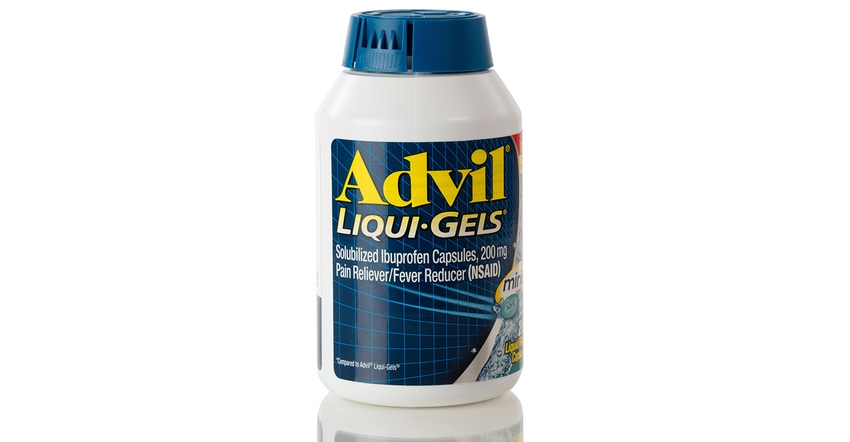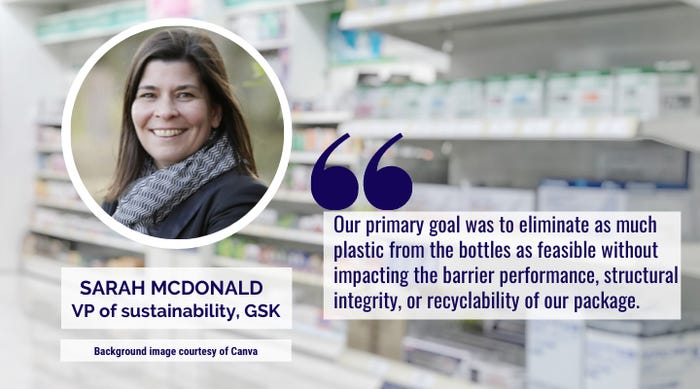GSK Consumer Healthcare’s first-of-its-kind plastic resin technology will cut the amount of high-density polyethylene (HDPE) by nearly 500,000 pounds.

Advil maker GSK Consumer Healthcare (GSK) announced April 19 a commitment to reducing the plastic in more than 80 million Advil bottles by 20%, which will result in a reduction of nearly 500,000 pounds of plastic in the environment. By 2022, Advil will have reduced the plastic in nearly all bottles available in stores and online, with the exception of the brand’s Easy Open bottles.
The new barrier resin technology reduces the amount of resin required to mold and craft the high-density polyethylene (HDPE) bottles, while maintaining the same barrier protection properties.
"As a world leader in pain relief, we at GSK are proud to transition Advil to a more environmentally friendly packaging, further supporting GSK's commitment to sustainability," says Sarah McDonald, VP of sustainability. "With the new technology available to us, we saw this as an opportunity to invest in the future of our brands and sustainability goals. The initiative is a first in the over-the-counter (OTC) medicine category, and kicks off a series of plastic reduction initiatives across the GSK product portfolio."

What and who’s involved.
“Our primary goal was to eliminate as much plastic from the bottles as feasible without impacting the barrier performance, structural integrity, or recyclability of our package,” says McDonald. “We successfully achieved all three without any impact to our product shelf life.”
Rather than a discrete barrier layer, the bottle is comprised of a homogenous barrier resin, specifically a unique Bimodal HDPE resin with a nucleating agent, according to McDonald. “This additive allows for the reduction in plastic while maintaining the same product protections. We chose this material due to the unique properties of the HDPE to work with the barrier additive while maintaining it’s 100% recyclability.”
From Dow, Bimodal HDPE is a resin engineered for “lightweight pharmaceutical bottles that provides a gas barrier and extended shelf life,” according to the company’s website.
McDonald credits the success of the lightweighting program to GSK’s collaboration/partnership with Dow and Milliken for the materials and Alltrista Plastics for the manufacturing.
Both the incumbent and new bottles are fully technically recyclable through the HDPE recycling stream, she points out.
The conversion does not include the brand’s Easy Open bottles.
“We pursued the higher volume Advil bottles of the same design,” she explains. “This was done to minimize complexity and target more impactful volumes.”
Additional source reductions include the bottle’s cap, which uses 11% less plastic, McDonald informs PlasticsToday.
The US remains the sole benefit of the initiative for now. “The US is our largest market for Advil, accounting for 71% of total sales, so we wanted to focus on our largest market first, where we have the biggest opportunity to make an impact,” McDonald says.
The program will be communication this year primarily through digital channels, including online creative banners with key retailers for their Earth Day activations as well as a landing page on Advil.com, which will provide consumers with more details about the initiative.
Notably, the development serves as an expandable technology platform. “Other GSK product lines and brands are currently being assessed to use this technology,” she reports. “We started with Advil because the brand uses millions of bottles annually which has allowed us to have a large initial impact on plastics reduction.”
Seven years’ R&D and regulatory approval.
The scope and complexity of the undertaking and gaining FDA approval cumulatively proved lengthy.
“It took approximately seven years from concept initiation to execution of the program,” says McDonald. “Physical molding and testing to get us to commercialization occurred within the last two to three years. There was a significant amount of data required to give us a high degree of confidence for approval by the FDA and multiple iterations were required to achieve the targeted/expected material reductions.”
It has been well worth it, she tells PlasticsToday. “We are proud of the results and are excited to transition Advil to a more environmentally friendly packaging, further supporting GSK’s commitment to sustainability.”
Advil's line of products includes Advil Liqui-Gels, Advil Migraine, Advil PM, Children's Advil Allergy & Congestion Relief, and the brand's latest innovation, Advil Dual Action.
The focus on plastics and packaging is informed by the leading requirements set by the Ellen Macarthur Foundation, which GSK joined in 2020 as a commitment to help shift towards a circular economy for plastics. Last year, GSK announced ambitious new environmental sustainability goals in both climate and nature, aiming to have a net zero impact on climate and a net positive impact on nature by 2030.
About the Author(s)
You May Also Like




